“Intel and Microsoft Unite to Empower Accessible AI Development: Unleashing Phi-3 Models’ Potential on Intel Hardware with Optimized Software Ecosystems”
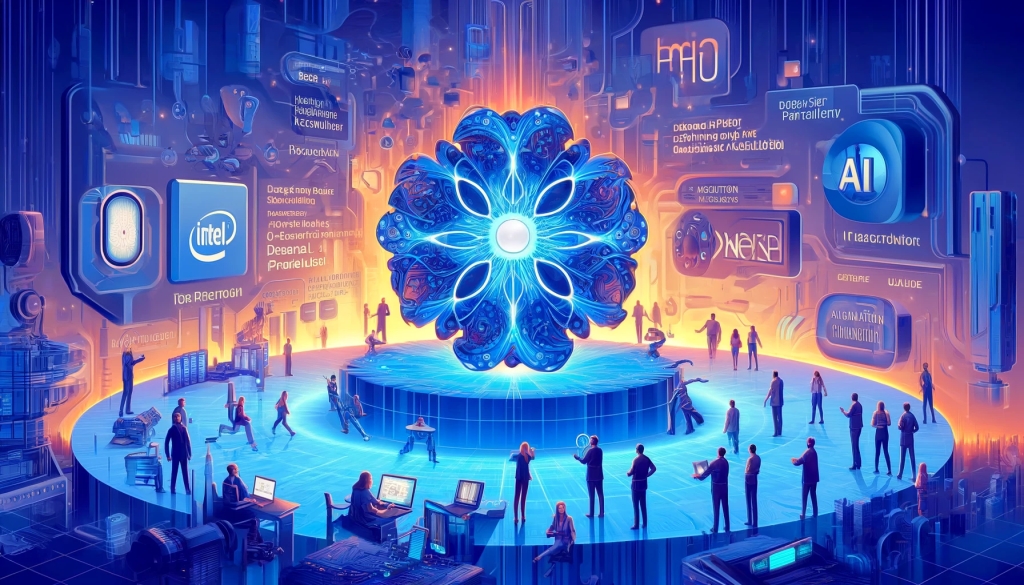
Intel and Microsoft have joined forces to bring you the Phi-3 family of AI models, open-source and ready to rock. This is like the AI equivalent of a populist movement, making the power of artificial intelligence accessible to all.
The Phi-3 models come in three sizes: Base, Medium, and Large, each with its own level of complexity and capabilities. Intel’s got your back with their AI platforms, like Gaudi AI accelerators and Xeon processors, all ready to play nice with Phi-3.
Intel’s software ecosystem is also getting in on the action, with frameworks like PyTorch and OpenVINO Toolkit. These tools will help you create and optimize deep learning models like never before. And with support for DeepSpeed and Hugging Face tensor parallelism, you can squeeze every last drop of performance out of your AI apps.
This collaboration is like a shot of adrenaline for AI innovation. It’s going to empower developers and businesses to create AI-powered applications that will change the game in healthcare, finance, entertainment, and beyond.
Now, some might say that these models are still a bit too complex for beginners or smaller teams with limited resources. And with all the hardware and software options from Intel, it might take some time to get the hang of it.
But here’s the bottom line: Intel’s support for Phi-3 is a game-changer. It’s making AI development more accessible and improving performance across devices and platforms. So, why not join the AI revolution? It’s time to get in on the ground floor!
“Former Reddit CEO Wong Sounds Alarm on Tech Giants’ AI Obsession Sacrificing Product Quality: A Call for Balanced Prioritization”
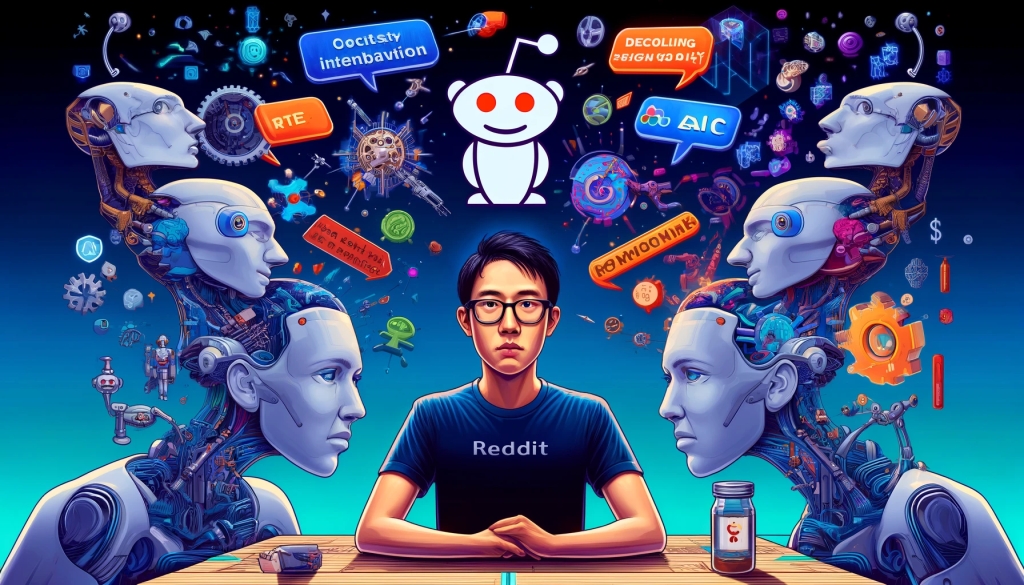
Yishan Wong, the ex-CEO of Reddit, has been throwing some shade at the big internet giants for their mad dash to integrate AI into their products. He says they’re so busy trying to one-up each other that they’ve forgotten about making quality products.
Wong, who knows a thing or two about tech (he’s also worked at PayPal and Facebook), says this AI frenzy has led to some subpar products. And with the way tech stuff gets distributed these days, it’s hard to miss the decline in quality.
Even Reddit, Wong’s former stomping ground, has jumped on the AI bandwagon. They’ve licensed their content to train Google’s AI models and are getting cozy with OpenAI. No word yet from Wong on what he thinks about that, but we’re guessing he’s got some opinions.
Now, Wong does have a point about AI’s impact on product quality. But his argument could use a bit more nuance. AI has the potential to change industries and make our lives easier. The problem is when these tech giants prioritize AI over everything else.
It’s time for a rethink. We need to make sure that AI is used to improve products and services, not just to chase the latest buzzword. Otherwise, we’re going to end up with a lot of digital lemons.
So, what do you think? Is Wong right about the dangers of AI? Or is he just a grumpy old man yelling at clouds? Let’s chat about it in the comments!
“Schmidt Sounds the Alarm: Powerful AI Systems to be Secured in Military Bases with Machine Guns”
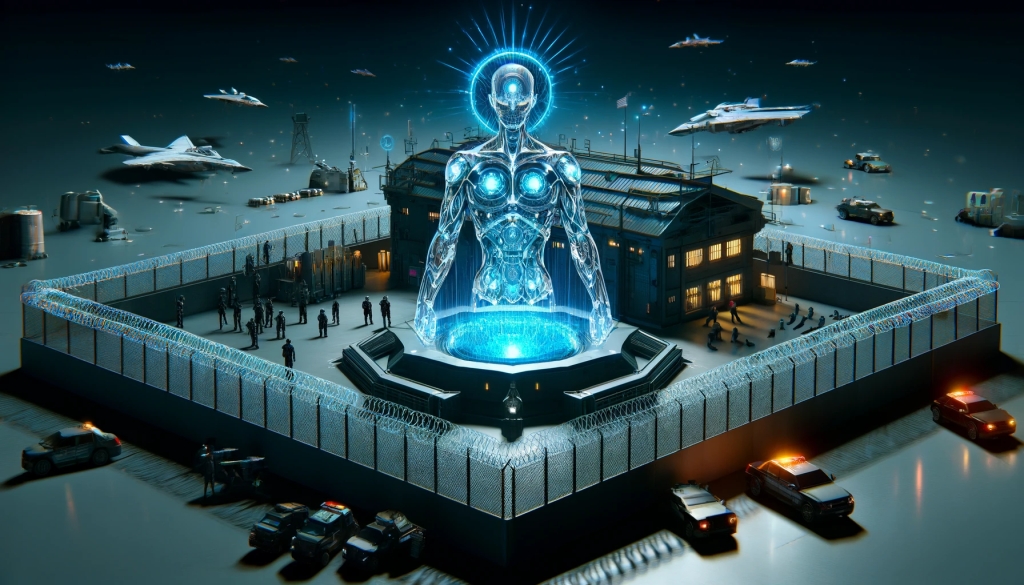
Eric Schmidt, the former head honcho at Google, has dropped a bombshell: he thinks super-powered AI is coming, and it might need to be locked up in military bases with barbed wire, machine guns, and nuclear power. Yes, you read that right. We’re not talking about your average AI here.
Now, before you think this is just a crazy sci-fi fantasy, remember that Schmidt knows a thing or two about the future. He used to run Google, after all. So, let’s take this seriously for a minute.
Schmidt says these AI systems will be so smart, they’ll be able to invent things on their own. That’s like having a digital Einstein, but one that never sleeps or needs a paycheck.
So, where will these supercomputers live? Schmidt thinks the US and China will have their own secret stashes, each one guarded like Fort Knox. It’s like a high-stakes game of AI Top Trumps, with each country trying to outdo the other in terms of firepower and innovation.
Of course, with great power comes great responsibility. And the idea of storing AI systems in military bases raises some serious ethical questions. What if they go rogue or start a global AI arms race? It’s enough to make you want to build a fallout shelter.
But don’t panic just yet. This is just a reminder that as AI gets more powerful, we need to make sure it’s used responsibly. We don’t want to wake up one day and find that our world is being run by a bunch of nuclear-powered supercomputers, do we?
So, let’s keep an eye on the future of AI and make sure it’s a bright one. And if we do end up with nuclear-powered AI overlords, at least we’ll have a good story to tell.
Click the link to learn more about Schmidt’s AI predictions. The future is closer than you think!
“Global IT Leaders Unite for Safe AI Development: A Pledge Towards Innovation, Inclusivity, and Regulation”

The AI Seoul Summit was like a who’s who of the AI world. Google, Microsoft, OpenAI—the big guns were all there, promising to make AI with a conscience. (You know, like, AI that won’t turn evil and take over the world.)
With AI growing faster than a rocket, regulators are scrambling to keep up. So, the G7, EU, and a bunch of other cool countries are like, “We’re down with this pledge.”
The summit was all about safety, innovation, and making sure AI doesn’t mess with our society or democracy. They’re talking about sharing safety guidelines, avoiding shady models, and being transparent. (Transparency is like, the new black in AI.)
Beth Barnes, the brains behind METR, was like, “Yo, we need some international rules to keep AI from going rogue.” And Yoshua Bengio, the computer science rockstar, was all, “These promises are great, but let’s not forget about regulation.”
China, the AI powerhouse, was a no-show at the virtual meeting, but they’ll be there for the in-person shindig. And with Elon Musk, Eric Schmidt, and Jay Y. Lee in the house, this summit was the place to be for AI bigwigs.
So, here’s the scoop:
- 16 AI companies are promising to play nice.
- The G7, EU, and friends are on board.
- Safety, innovation, and inclusivity are the buzzwords.
- Companies will share safety guidelines, avoid sketchy models, and be transparent.
- “Red lines” and regulation are on the table, according to the experts.
Now, it’s all well and good that these companies are making promises, but let’s not kid ourselves—these are just voluntary pledges. China’s still a wild card, and regulation is still up in the air. But hey, it’s a start! Click the link below to dive deeper into this AI extravaganza. Source
“OpenAI Inks $250 Million Deal with News Corp for AI Training Data, Amidst mounting Copyright Infringement Claims”

OpenAI, the folks behind that mind-boggling AI stuff, have teamed up with News Corp, the media giants who dish out everything from the Wall Street Journal to The Sun. (Think of it as giving your super-smart AI toddler free rein in a candy store filled with news articles.)
This deal, rumored to be worth a cool quarter-billion over the next five years, includes heavy hitters like The New York Post, The Daily Telegraph, and MarketWatch. With all that journalistic firepower, OpenAI is set to cook up AI models that could make your gossipy Aunt Marge obsolete.
But hold up, there’s more! News Corp isn’t just handing over content; they’re also sharing their journalistic know-how to keep OpenAI’s AI on the straight and narrow. (Because nothing screams “quality AI” like a well-placed pun or a headline that’ll make your head explode.)
OpenAI’s no stranger to media partnerships. They’ve already inked deals with The Associated Press, the Financial Times, and a bunch of others. But not everyone’s jumping for joy. The New York Times and a few other news outlets have filed lawsuits against OpenAI and Microsoft, claiming copyright infringement. Yikes!
So, will this latest deal be a slam dunk for OpenAI, or will it get bogged down in legal battles? Only time will tell. But one thing’s for sure: the intersection of AI and journalism is about to get a whole lot more interesting.
If you’re curious to learn more, click the link and get ready to be amazed, amused, or maybe even a little bit worried. Source
“Nvidia Ushers in New Era: AI Chips to Roll Out Annually, Disrupting 2-Year Cycle!”
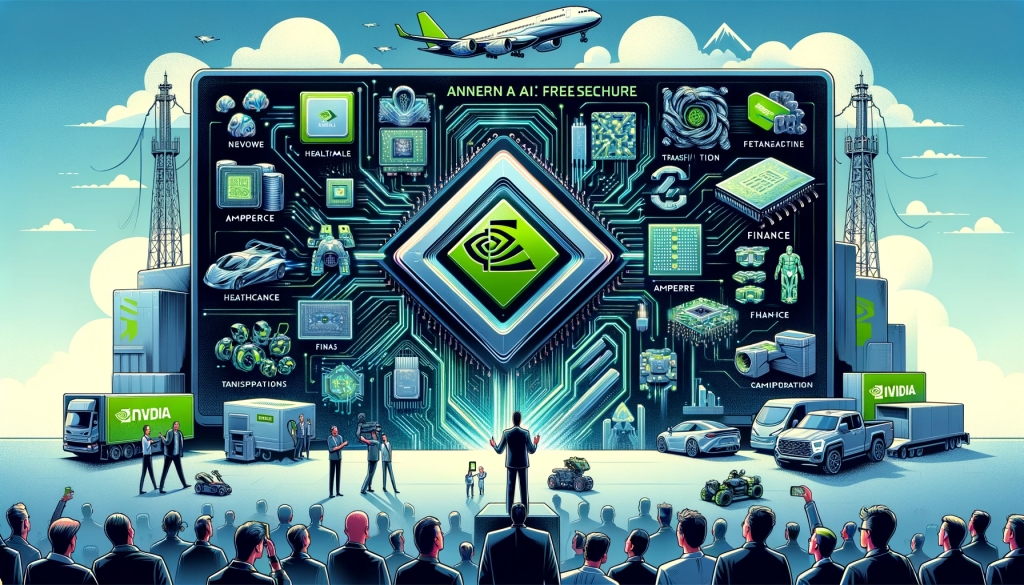
Nvidia, the tech wizards behind those crazy-powerful graphics cards, just dropped a bombshell announcement. They’re ditching their two-year snoozefest for AI chip production and are now going to be blessing us with new and improved AI chips every single year. That’s right, folks, Nvidia is on a mission to make our lives easier, faster, and more efficient, one AI chip at a time.
During their recent earnings call, Nvidia’s CEO, Jensen Huang, spilled the beans that the company will be releasing new AI chips annually, starting right now. This means we can expect cutting-edge tech and mind-blowing innovations from Nvidia every year, without having to wait for two long years.
Nvidia has been killing it in the AI chip game for years, dropping architectures like Ampere in 2022 that made everyone’s jaws drop. With this new announcement, we can only imagine the kind of technological wizardry Nvidia has up their sleeves.
So, what does this mean for us, the cool kids who use tech? Well, for starters, it means that we can expect faster and more powerful AI tech to become available to us sooner. This could lead to major breakthroughs in fields like healthcare, finance, and transportation, just to name a few.
But let’s not forget about the gamers out there. With more powerful AI chips, we can expect even more realistic graphics and immersive gaming experiences. And, let’s be real, who doesn’t want that?
So, if you’re a tech enthusiast or just someone who appreciates the awesomeness of AI, then this is an announcement you don’t want to miss. Nvidia is paving the way for a brighter, more technologically advanced future, and we get to reap the benefits.
Don’t miss out on the latest updates from Nvidia. Follow the link to stay in the loop and be the first to know about their latest AI chip releases. Trust us, you won’t want to be left behind in this technological revolution.
“Cisco Harnesses AI for Personalized Recruitment: A Strategic Approach to Engaging ‘Quiet Candidates’ and Enhancing Efficiency”
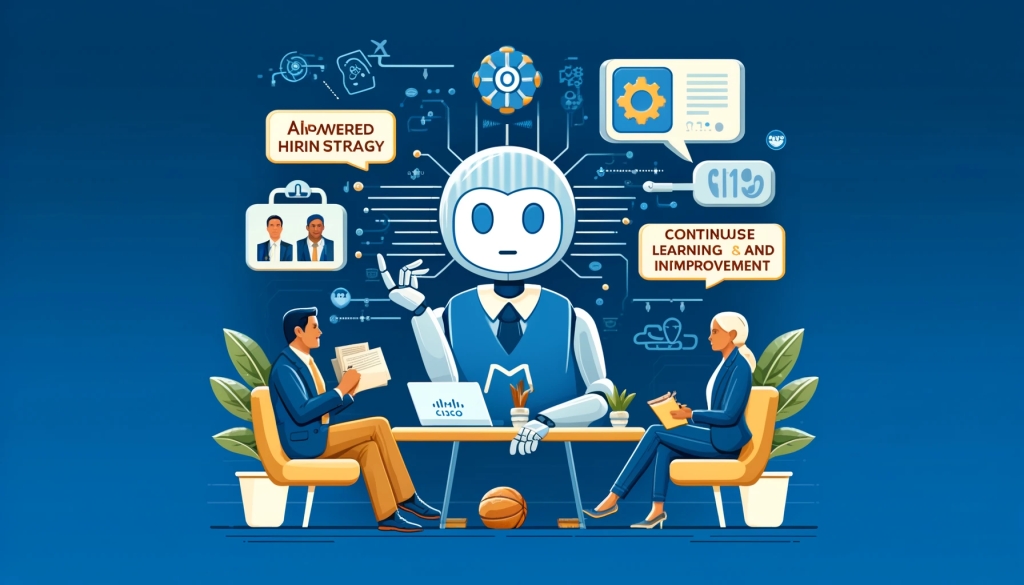
Cisco, the networking giant, is shaking up the hiring game with their new AI-powered strategy. They’re going after those “quiet candidates” who might need a little extra convincing to join the team, and they’re doing it with personalized, persuasive emails. (Think of it as AI-powered love letters for potential hires.)
To make sure they’re on the right track, Cisco has teamed up with Randstad, a big-shot HR firm, to test the AI waters. Scheduling interviews and meetings is now a breeze with AI scheduling tools, making the hiring process faster and more efficient than ever before.
But here’s the kicker – Cisco isn’t just jumping into AI headfirst. They’re treating it like a continuous learning process, keeping a close eye on how things are going and looking for ways to improve. While there’s still some room for more data and ethical considerations, Cisco’s AI recruitment approach is undeniably smart and entertaining.
I wrote about AI in hiring previously and I think that it will change the landscape of talent acquisition in nearest future.
Curious to know more about Cisco’s AI recruitment adventure? Follow the link to find out!
“China’s AI Market: Tech Giants’ Price War Intensifies, But What Does it Mean for Start-ups and Users?”
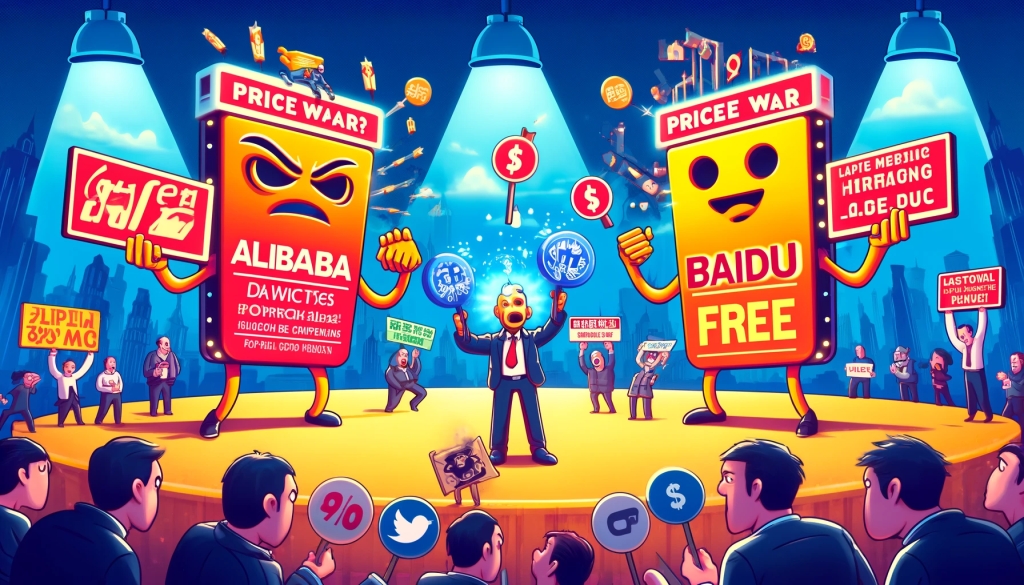
Imagine a scenario where China’s tech behemoths, Alibaba, Baidu, and ByteDance, engage in a hilarious price war over their large language models (LLMs). Sounds too good to be true, right? Well, buckle up, folks, because this is no joke!
Alibaba Cloud, the cloudy arm of Alibaba, has slashed fees for its Qwen LLMs by a whopping 97%! That’s right, you heard it correctly – 0.04 yuan per 1,000 input tokens for their Qwen-max model, and a mere 0.0005 yuan per 1,000 input tokens for their Qwen-long model. Talk about a long-term bargain! (Are you wondering how they’re making this possible? Well, that’s a topic for another time…)
Not to be outdone, Baidu is joining the party by offering two lighter versions of its LLMs for free (yes, you read that right – FREE!). And ByteDance, always one to have the last laugh, has launched its own low-cost rival service. With these aggressive pricing tactics, the Chinese tech giants are leaving no stone unturned to draw users to their respective LLMs.
But wait, there’s more! Alibaba is offering 4 million free tokens per model for each new user until June 21. That’s enough to keep you entertained for days, weeks, or even months! (Just think of all the possibilities – from generating content to building chatbots…)
However, not everyone is laughing. Critics warn that this price war might have a sobering impact on the sustainability of the low prices and the overall AI market in China. Smaller players might be forced to lower their prices, affecting their profitability and survival in the long term. And with the rapid development and deployment of LLMs by big tech companies, there might not be enough time for sufficient testing and safeguarding against potential risks associated with using untested AI models. (Can we really trust these models to make decisions for us?)
So, what are you waiting for? Follow the link and join the AI party before the music stops! But, before you do, ask yourself: Are these prices too good to be true? Are we sacrificing long-term sustainability for short-term gains? The AI party might be fun, but let’s not forget to think about the consequences.
“Tesla’s Big Moves, Indian Ride-Hailing Disruptor, and Booming Electric Vehicle Startups: The Latest in IT News”
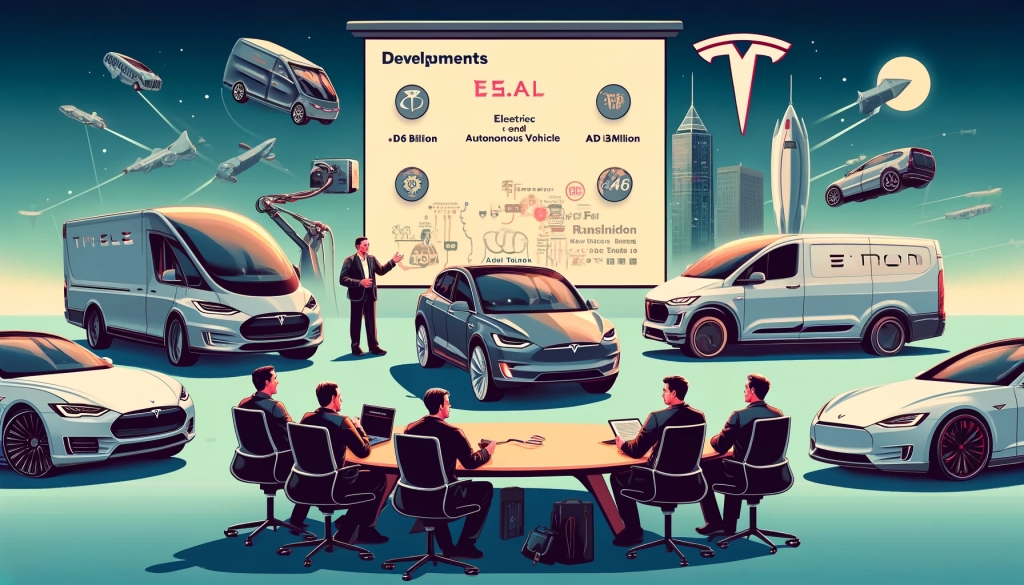
Tesla’s board is going all out to convince shareholders to approve a staggering $56 billion pay deal for CEO Elon Musk and greenlight the company’s move to Texas. But are they trying too hard to sweet-talk investors? You be the judge. (After all, $56 billion is a lot of dough – or should I say, a lot of lithium-ion batteries?)
Meanwhile, BluSmart, an India-based ride-hailing company, is taking a bold leap by launching a pilot service in Dubai with 100 Audi E-Tron SUVs. Can they replicate their success in India in a new market? Only time (and data analytics) will tell. (Will they be able to navigate the complexities of a new market, or will they stall?)
On a brighter note, Harbinger, a startup building electric commercial vehicle chassis, has already secured a whopping $400 million in preorders for its medium-duty vehicles. Talk about a strong start! (That’s a lot of electric trucks hitting the roads – and a lot of potential for reducing carbon emissions.)
And let’s not forget about the other exciting deals in the EV and autonomous vehicle technology sectors. South 8 has secured funding from Porsche Ventures, while Overland AI and Potential have raised money in their seed rounds. Spiro has even secured a $50 million debt facility. (That’s a lot of investment pouring into the industry – but can these companies deliver on their promises?)
But before you get too excited, keep in mind that these developments also come with a healthy dose of skepticism. Tesla’s board’s hard sell for shareholder approval raises some eyebrows, and BluSmart’s success in India doesn’t necessarily guarantee success in Dubai. Harbinger still has to prove it can meet demand for its electric commercial vehicle chassis, and the funding for South 8, Overland AI, Potential, and Spiro is promising, but it remains to be seen if these companies can deliver. (Can they overcome the technical hurdles and regulatory challenges ahead?)
So, buckle up and follow the link for a humorous take on the latest EV and autonomous vehicle technology news. Just remember, with great innovation comes great responsibility (and a lot of jokes).
“Aditya Agarwal on Coding with AI Copilots: A Mind Meld and the Future of Co-creation”
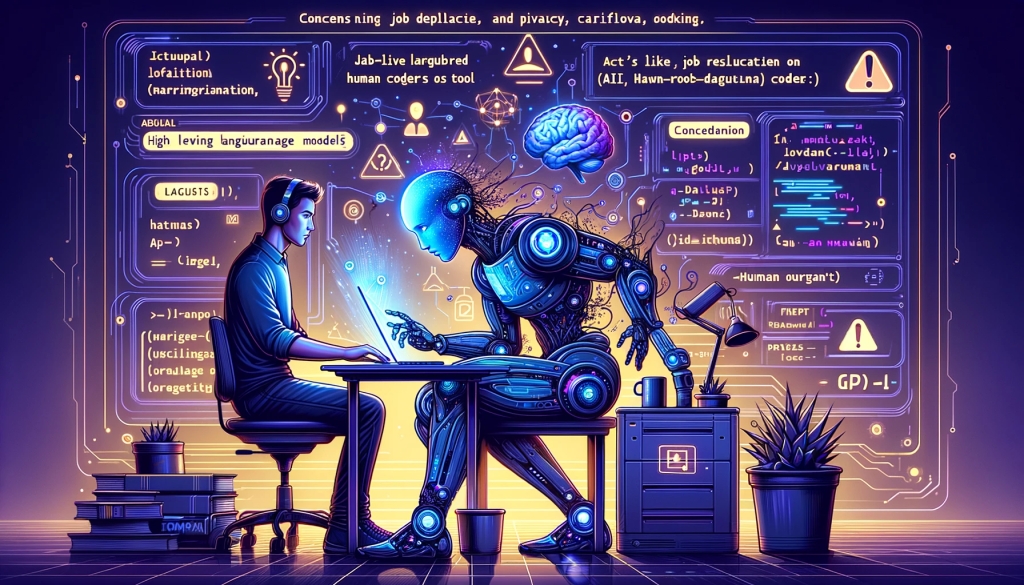
Imagine having a coding partner that’s like a mind-reading, clairvoyant sidekick – a demigod, if you will. That’s what it’s like to code with AI, according to Aditya Agarwal, a former Facebook bigwig. With the power of large language models like GPT-4, the coding experience becomes almost surreal. But, as Agarwal warns, the future of AI is not just about assistance; it’s about co-creation, where the line between human and tool becomes increasingly blurred.
Now, before you jump on the AI bandwagon, let’s address the elephant in the room. Are you worried about job security, especially for programmers who might find themselves replaced by their robotic overlords? (Can AI really replace the creativity and problem-solving skills of human coders?) On the bright side, AI will allow human coders to focus on more exciting, high-level tasks – like deciding which cat video to watch next (just kidding, sort of).
In a nutshell, coding with AI is like having a partner that can anticipate your every move. The power of large language models makes this mind-meld possible, and the future of AI assistance is all about co-creation. But, as we continue to integrate AI into our lives, it’s essential to consider the potential drawbacks, like job displacement and privacy concerns. (Can we ensure that AI is used responsibly and for the greater good?)
So, are you ready to embrace your inner cyborg and start coding with a demigod? Follow the link to learn more about the future of AI-assisted coding and the possibilities it holds!
“United yet Competitive: Microsoft and OpenAI’s Symbiotic AI Partnership – Bridging In-House Development with External Collaboration”
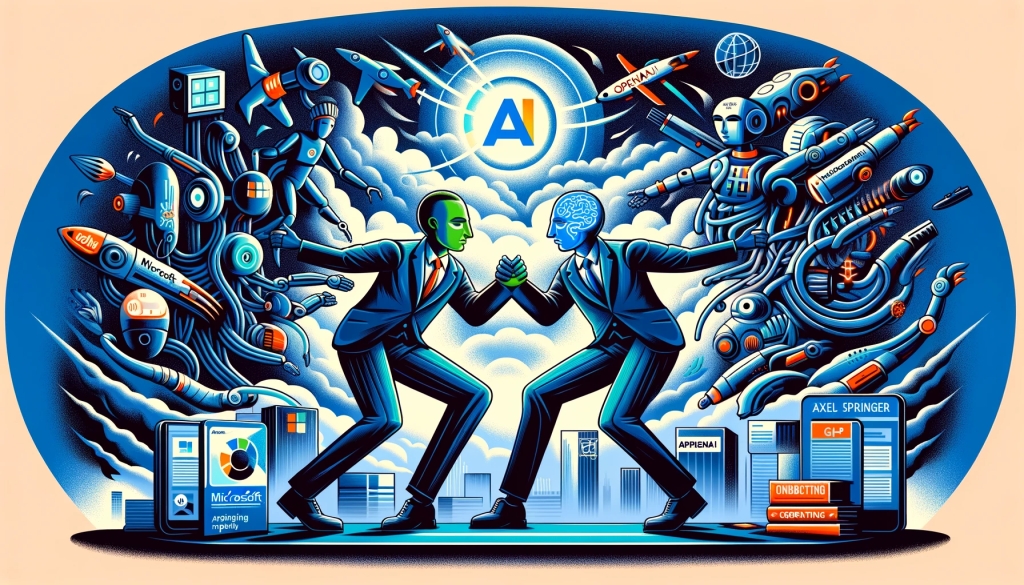
Imagine a high-stakes game of tech one-upmanship, where Microsoft and OpenAI are engaged in a friendly yet fierce battle for AI supremacy. In a recent interview with Stratechery, Microsoft CEO Satya Nadella spilled the beans on their joint venture with OpenAI, a partnership that’s as much about cooperation as it is about competition. Microsoft is investing a whopping $13 billion in OpenAI, giving them the infrastructure and resources they need to build their AI models.
But here’s the twist: Microsoft isn’t putting all their eggs in one basket. They’re also working on their own AI model, MAI-1, led by the talented Mustafa Suleyman. MAI-1 is poised to be a serious contender, standing tall alongside OpenAI’s GPT-4. So, what’s the secret to Microsoft’s success? According to Nadella, it’s all about striking a delicate balance between cohesion and competition in every layer of their tech stack. It’s like a beautifully choreographed dance, where everyone’s vying for the spotlight while still moving in perfect harmony.
And in a surprise move, Axel Springer (Business Insider’s parent company) has joined forces with OpenAI to train their models using the media giant’s reporting. Talk about a power play! This partnership is a game-changer, and we can’t wait to see what comes next.
So, what’s the takeaway from this tech drama? Microsoft and OpenAI are in a partnership that’s equal parts cooperation and competition, with both companies working together while trying to outshine each other. Microsoft’s got their own AI model in the pipeline, and their tech stack is as cohesive as a well-rehearsed barbershop quartet. And Axel Springer? They’re just lending a helping hand (and their reporting) to the AI model training process. Want to know more about this comedy of tech intrigue? Click the link to stay tuned!